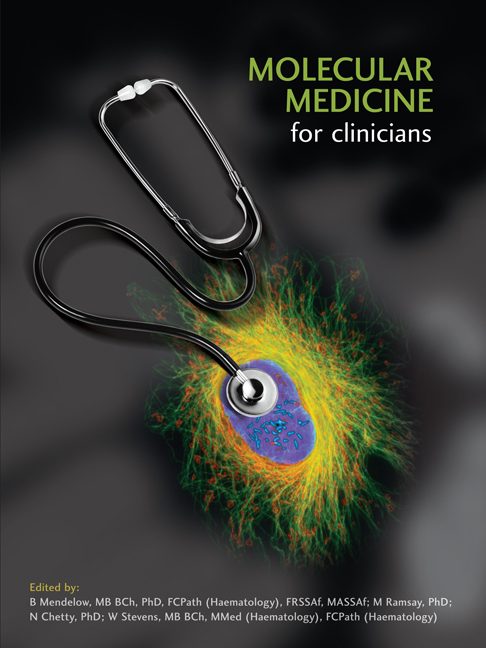Book contents
- Frontmatter
- Contents
- Foreword
- Acknowledgements
- Chapter 1 Introduction
- Keynote Essay 1: Defining Who We Are: DNA in Forensics, Genealogy and Human Origins
- Section 1 Principles Of Cellular And Molecular Biology
- SECTION 2 MOLECULAR PATHOLOGY
- Chapter 8 Genomes and the Environment: An Overview of Molecular Pathology
- Chapter 9 Genetics, Genomics, Health and Disease: General Considerations
- Chapter 10 Chromosome Disorders
- Chapter 11 Mendelian Inheritance
- Chapter 12 Unusual Molecular Processes that Impact on Disease
- Chapter 13 Population Genetics
- Chapter 14 Complex Multifactorial Inheritance
- Chapter 15 Molecular Basis for Phenotypic Variation
- Chapter 16 Medical Genetics
- Keynote Essay 3: Human Cloning: Should We Go There?
- Chapter 17 Neoplasia: General Considerations
- Chapter 18 Oncogenes
- Chapter 19 Mammalian DNA Repair
- Chapter 20 Tumour Suppressor Genes and Inherited Susceptibility to Cancer
- Chapter 21 Carcinoma
- Chapter 22 Leukaemias and Lymphomas
- Chapter 23 Molecular Approaches to the Diagnosis, Prognostication and Monitoring of Cancer
- Keynote Essay 4: Microbes, Molecules, Maladies and Man
- Chapter 24 Molecular Basis of Infectious Diseases: General Considerations
- Chapter 25 Immunology
- Chapter 26 Human Immunodeficiency Virus
- Chapter 27 Tuberculosis
- Chapter 28 Malaria
- Chapter 29 Influenza
- Chapter 30 Oncogenic Viruses
- Chapter 31 Vaccines and Immunisation
- Keynote Essay 5: Drugs and the 21st Century
- SECTION 3 MOLECULAR THERAPEUTICS
- SECTION 4 RESEARCH AND THE CONTINUING EVOLUTION OF MOLECULAR MEDICINE
- Glossary
- Contributors’ Biographies
- Source Material And Recommended Reading
- Permissions And Credits
- Index
Chapter 30 - Oncogenic Viruses
from SECTION 2 - MOLECULAR PATHOLOGY
Published online by Cambridge University Press: 04 June 2019
- Frontmatter
- Contents
- Foreword
- Acknowledgements
- Chapter 1 Introduction
- Keynote Essay 1: Defining Who We Are: DNA in Forensics, Genealogy and Human Origins
- Section 1 Principles Of Cellular And Molecular Biology
- SECTION 2 MOLECULAR PATHOLOGY
- Chapter 8 Genomes and the Environment: An Overview of Molecular Pathology
- Chapter 9 Genetics, Genomics, Health and Disease: General Considerations
- Chapter 10 Chromosome Disorders
- Chapter 11 Mendelian Inheritance
- Chapter 12 Unusual Molecular Processes that Impact on Disease
- Chapter 13 Population Genetics
- Chapter 14 Complex Multifactorial Inheritance
- Chapter 15 Molecular Basis for Phenotypic Variation
- Chapter 16 Medical Genetics
- Keynote Essay 3: Human Cloning: Should We Go There?
- Chapter 17 Neoplasia: General Considerations
- Chapter 18 Oncogenes
- Chapter 19 Mammalian DNA Repair
- Chapter 20 Tumour Suppressor Genes and Inherited Susceptibility to Cancer
- Chapter 21 Carcinoma
- Chapter 22 Leukaemias and Lymphomas
- Chapter 23 Molecular Approaches to the Diagnosis, Prognostication and Monitoring of Cancer
- Keynote Essay 4: Microbes, Molecules, Maladies and Man
- Chapter 24 Molecular Basis of Infectious Diseases: General Considerations
- Chapter 25 Immunology
- Chapter 26 Human Immunodeficiency Virus
- Chapter 27 Tuberculosis
- Chapter 28 Malaria
- Chapter 29 Influenza
- Chapter 30 Oncogenic Viruses
- Chapter 31 Vaccines and Immunisation
- Keynote Essay 5: Drugs and the 21st Century
- SECTION 3 MOLECULAR THERAPEUTICS
- SECTION 4 RESEARCH AND THE CONTINUING EVOLUTION OF MOLECULAR MEDICINE
- Glossary
- Contributors’ Biographies
- Source Material And Recommended Reading
- Permissions And Credits
- Index
Summary
INTRODUCTION
Viruses are infectious agents that invade living cells in order to reproduce themselves. Typically they attach to receptors on the surface of the target cell, and once inside the cell they harness the host's protein synthesis and energy-generating pathways to form progeny particles. As a consequence of this type of replicative cycle viruses cause a variety of pathological consequences, which include malignant transformation of host cells. The concept that viruses cause cancer dates back to the first decade of the twentieth century, when experiments by Francis Peyton Rous showed that an agent that passed through a filter could induce tumours in chickens. This pioneering work was recognised more than 50 years later with the 1966 Nobel Prize.
Viruses may alter cells in ways that predispose to cancer through a variety of mechanisms. These include direct mechanisms such as integration of viral DNA into target cells and indirect effects such as inducing an immunodeficient state. The major classes of viruses that are linked to cancer and will be discussed below are retroviruses, herpesviruses, papillomaviruses, hepadnaviruses (hepatitis B), and flaviviruses (hepatitis C).
RETROVIRUSES
Retroviruses comprise a large family of enveloped viruses. A common characteristic of the replication of these viruses is that the mechanism involves reverse transcription of virion RNA into double-stranded DNA. The size of the RNA genome ranges from 7 to 12 kb and there are typically two copies of the RNA genome in each virion particle. DNA formed from RNA reverse transcription is typically integrated into the host genome as a provirus. An outline of the retrovirus life cycle is summarised in Figure 1.
HIV-1, classic example of a retrovirus
The immunodeficiency of HIV-1 infection is associated with an increased incidence of several different malignancies. Included among these are Kaposi's sarcomas, non- Hodgkin's lymphoma, Hodgkin's disease, squamous cell neoplasms and leiomyo - sarcoma in children. Interestingly, this spectrum of malignancies is not common to all immunodeficient states. Kaposi's sarcoma is uniquely increased in HIV-1-infected individuals and also within subgroups of the HIV- 1-infected population.
- Type
- Chapter
- Information
- Molecular Medicine for Clinicians , pp. 359 - 366Publisher: Wits University PressPrint publication year: 2008



